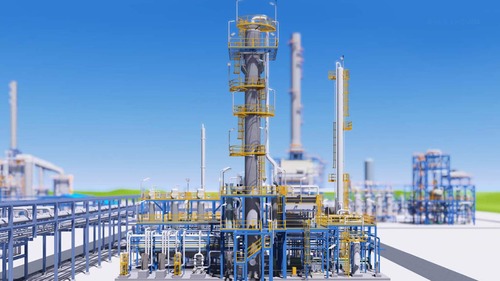Honeywell and Repsol to collaborate on renewable fuel development
CHARLOTTE, N.C. – Honeywell (Nasdaq: HON) and Repsol today announced a collaboration to create new production pathways for biofuels and circular materials. The two will also explore the possible integration of these methods into Repsol’s existing facilities.
The companies plan to scale and commercialize Honeywell's technologies, which use various wastes like fats, oils, greases, biomass and solids for chemical production and renewable fuels at Repsol’s refineries. Their goal is to produce different biofuels, including sustainable aviation fuel (SAF) and renewable diesel, while making use of existing refinery assets. This collaboration supports the alignment of Honeywell’s portfolio with the energy transition megatrend.
"As a global leader in sustainable fuel technologies, we seek collaborations to provide innovative solutions that help our customers and stakeholders to reduce carbon and greenhouse gas emissions through biofuel production." said Bryan Glover, Chief Growth Officer and CTO of Honeywell Energy and Sustainability Solutions. "Our collaboration with Repsol illustrates how Honeywell can apply new technologies to reduce carbon emissions while producing biofuels and advanced materials leveraging current refinery infrastructure."
The multi-energy company is also analyzing the deployment of Honeywell's UpCycle Process Technology, which turns waste plastic into Honeywell Recycled Polymer Feedstock for new plastics. It can recycle diverse plastics like colored, flexible, multilayered packaging and polystyrene. When used in conjunction with other chemical and mechanical recycling processes - along with improvements to collection and sorting - Honeywell's UpCycle Process Technology has the potential to help create the capability to recycle nearly 90% of waste plastics. This would represent a considerable increase in the amount of waste plastics that can be turned into polymer feedstock.[1]
"Renewable fuels and plastics recycling are crucial to Repsol’s commitment to achieve net zero emissions by 2050,” said Berta Cabello, Repsol’s Director of Renewable Fuels. “Our collaboration with Honeywell to advance and adopt cutting-edge technologies will help us reduce our carbon footprint and become a benchmark in renewable fuels and hydrogen production by 2030."
The two companies have a history of successful cooperation in various areas, such as licensing and developing petrochemical units, catalysts, technical support and troubleshooting, digitalization and technology. In 2023, Repsol selected Honeywell’s Ecofining™ technology to make renewable fuels from sources like used cooking oil and waste animal fat at its plant in Puertollano, Spain. This technology was developed and commercialized jointly by Honeywell in collaboration with ENI S.p.A. Repsol is building this plant to produce about 240,000 metric tons per annum of renewable diesel and other products.
This technology was developed and commercialized jointly by Honeywell in collaboration with ENI S.p.A. Repsol is building this plant to produce about 200,000 metric tons per annum of renewable diesel and other products.
- Assuming sorting and collection improves to recover most waste plastic, and chemical recycling, including Honeywell UOP UpCycle Process, is widely deployed. The 90 percent of waste plastics that could be recycled may change depending on the number of consumers or communities that have access to recycle waste plastics or the availability of recycle facilities.
Latest news
ORLEN launches sales of new aviation fuel: SAF now available at Polish airports
The introduction of SAF at Warsaw Chopin Airport is a major milestone in the aviation sector’s transition toward climate neutrality. Our priority is to establish the conditions necessary for carrie...
Investment in CO2 transportation pipeline project to decarbonize UK cement and lime industry
Sumitomo Corporation has agreed new funding for the development of the CO2 transport pipeline, to support Peak Cluster Carbon Capture project (“Peak Cluster”). Peak Cluster will capture CO2 from fo...
BASF and BACHL complete transfer of Styrodur® business to BACHL
The sale also includes the brand Styrodur®. Approximately 50 employees in production, marketing and sales at BASF SE are involved in the Styrodur business. The affected employees will remain with B...
ORLEN has secured PLN 2.5 billion to finance green investments
The involved investments include the development and acquisition of new renewable energy capacities, further expansion of zero-carbon transport infrastructure (including fast-charging stations for ...

